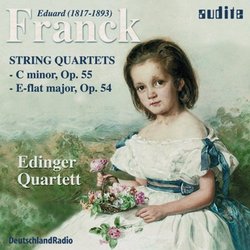| All Artists: Eduard Franck Title: Eduard Franck: String Quartets, Opp. 54 & 55 Members Wishing: 0 Total Copies: 0 Label: Audite Original Release Date: 1/1/2001 Re-Release Date: 10/30/2001 Genre: Classical Styles: Chamber Music, Historical Periods, Classical (c.1770-1830) Number of Discs: 1 SwapaCD Credits: 1 UPCs: 402143200321, 4022143200327 |
Search - Eduard Franck :: Eduard Franck: String Quartets, Opp. 54 & 55
 | Eduard Franck Eduard Franck: String Quartets, Opp. 54 & 55 Genre: Classical
|
Larger Image |
CD Details |
CD ReviewsWhat a Find! J Scott Morrison | Middlebury VT, USA | 05/04/2007 (5 out of 5 stars) "It's only recently, through the enthusiasm of a chamber-music loving friend, that I have been discovering the music of Eduard Franck (1817-1893) and that of his son Richard (1858-1938). This CD contains the String Quartets Nos. 2 & 3 of Eduard and are a revelation. How could music this good have languished in obscurity for more than a hundred years? Part of the reason may be that Franck was an unrelenting perfectionist and did not publish until late in his life and that the publisher of these quartets let the scores go out of print. But they have been rescued, along with other works by the Francks père et fils, and some of them have now been recorded by the Edinger Quartet, led by the estimable violinist Christiane Edinger, with the addition of other chamber musicians when needed. All praise to them and the Audite label for issuing these performances.
These two quartets have succeeding opus numbers, Op. 54 and 55, but it is not clear whether they were written consecutively. Probably not. Op. 54 in E flat was written in 1847. Op. 55 was not published until the late 1890s, after Franck's death, and its date of composition is not clear. Suffice it say that the two quartets could not be more different, but each is brilliant in its own way. Op. 54 is a gentle Mendelssohnian composition and has striking virtuosic passages for each of the four instruments, most particularly the first violin and the cello. Its form, though, is more complex than any chamber works of Mendelssohn's that I'm familiar with; rather it seems formally more akin to late Beethoven quartets. Particularly impressive are the lamenting slow movement and the imaginative variations of the finale. Op. 55 is much the more dramatic of the two, particularly in the outer movements. It second movement, a sweetly sad chorale, gives ample evidence that Eduard Franck was a master melodist. The scherzo is a rough peasant dance with a lyrical trio. The finale, which appears to be a set of irregular variations, follows the scherzo without pause. The join between the two movements is particularly interesting; just when one thinks the scherzo is finishing in classic style it stumbles headlong into the finale. Brilliant. The performances here are all one could ask for. It is clear that the Edinger Quartet loves this music and is convinced of its historical and musical value. Thanks to one and all involved in the production of this recording. Highly recommended. Scott Morrison " |

 Track Listings (8) - Disc #1
Track Listings (8) - Disc #1